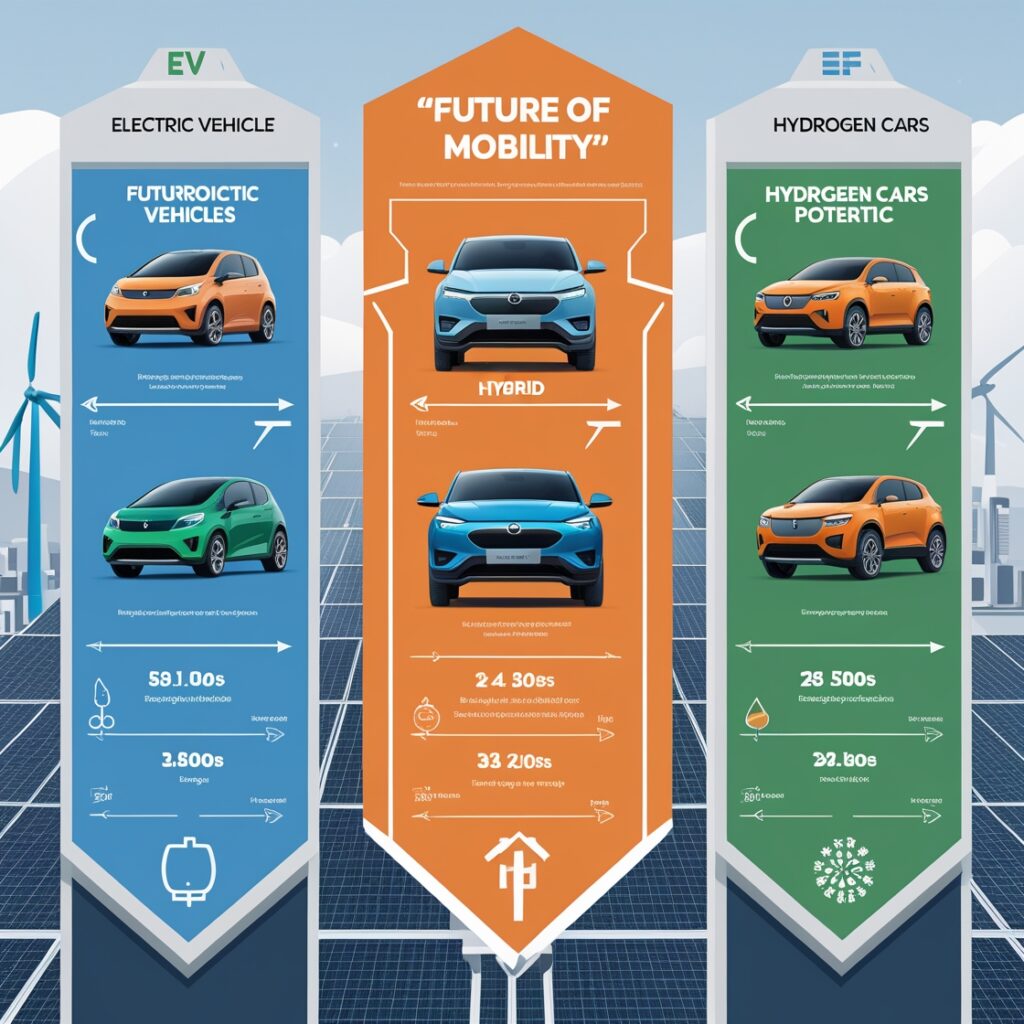Introduction
Automakers are stuck at a fork in the road. As humans enter this new phase of motoring, several questions have confronted the consumer; EV vs. Hybrid vs Hydrogen Cars – which is to be the future? Each has promised a greener, further-reaching way of motoring than the others, but the way ahead is very far from the simplicity it is made out to be.

In this detailed review, we are going to break down the benefits, obstacles, and prospects for each vehicle type to help you decide which one best fits your needs and what transportation will look like in the future.
The Rise of Electric Vehicles (EVs)
Electric Vehicles (EVs) are the poster child of the green revolution. Tesla, Rivian, and legacy automakers such as Ford and BMW have all invested billions in electrification. But what’s really the future EV vs. Hybrid vs Hydrogen Cars?
Pros of EVs:
Zero Emission: No tailpipe and no carbon footprint, except from power generation.
Lower Operating Costs: Electricity is much cheaper compared to gasoline.
Government Incentives: Tax benefits and subsidies in many countries for buying an EV.
Simplified Maintenance: Fewer moving parts translate to fewer breakdowns and repairs.
Challenges of EVs:
Charging Infrastructure: While charging stations are growing, using an electric vehicle for long road trips can be tricky.
Battery Longevity & Replacement Costs: Battery degradation remains a concern.
Limited Range: Despite improvements, range anxiety remains a fact of life for many consumers.
EVs may be leading the charge in the narrative, but they are not the only players in the game.
Hybrid Cars: The Best of Both Worlds?
Hybrid cars have been on the road for more than two decades, with pioneers such as the Toyota Prius. By marrying an internal combustion engine (ICE) with an electric motor, they boast better fuel economy without having to rely wholly on charging stations.
Benefits of Hybrid Cars:
Extended Range: No need to worry about charging; gasoline extends range significantly.
Lower Emissions: While not emission-free, hybrids produce far less CO₂ than traditional gasoline cars.
More Affordable Than EVs: Generally cheaper upfront costs compared to full-electric counterparts.
Regenerative Braking: A method of converting kinetic energy into usable power, thereby increasing efficiency.
Challenges of Hybrid Cars:
Not Fully Green: Still runs on fossil fuels.
Higher Maintenance Costs Than EVs – The more components, the greater the potential problems with both the ICE and the electric system.
Government Support is Declining – Most of the subsidies now favor fully electric vehicles over hybrids.
Hybrids offer a transition solution, but are they just a stepping stone to a fully electric future? Or is there another competitor in the ring?
Hydrogen Fuel Cell Vehicles: The Dark Horse?
Hydrogen fuel cell electric vehicles are often overlooked, but with companies such as Toyota’s Mirai, Hyundai Nexo, and Honda tinkering with hydrogen propulsion, these vehicles promise long-range capabilities and fast refueling.
Pros of Hydrogen Cars:
Fast Refuel-as with gas, hydrogen cars’ tanks will fill up in 5 to 10 minutes.
Long Range-FCEVs usually provide more range than their battery EV cousins.
Zero Emissions-the only byproduct of hydrogen fuel cells is water vapor.
Less strain on the grid: Hydrogen, unlike electric vehicles, does not rely on electrical infrastructure.
Challenges of Hydrogen Cars:
Scarce infrastructure: There are very few hydrogen refueling stations, and it will be hard for widespread adoption to occur.
High production costs: Hydrogen fuel cells are expensive and power-hungry to make.
Energy Efficiency Issues: More energy is required to produce, store, and transport hydrogen than to actually charge the battery of an electric vehicle.
Hydrogen is an exciting prospect for the future, but is it practical?
The Battle for Dominance: Which One Wins?
Performance & Efficiency
EVs: Highly efficient, utilizing energy directly from the battery to the motor (~90%).
Hybrids: More efficient than gasoline cars but still rely on fossil fuels.
Hybrid Hydrogen: Less efficient because of the losses in hydrogen production (~40-60%).
Convenience & Infrastructure
EVs: Growing, yet still constrained by charging station and grid capacity.
Hybrids: Most versatile, as no infrastructure adjustments are required.
Hydrogen: Suffers greatly from a general lack of refueling stations.
Cost Considerations – EV vs. Hybrid vs Hydrogen Cars
EVs: Higher upfront costs but lower running costs.
Hybrids: Mid-range pricing with maintenance costs similar to gasoline cars.
Hydrogen: Most expensive due to fuel cell production and limited availability.
Environmental Impact – EV vs. Hybrid vs Hydrogen Cars
EVs: Zero emissions but relies on battery mining.
Hybrids: Lower emissions but still dependent on oil.
Hydrogen: Cleanest emissions but energy-intensive production.
The Future of Mobility: Predictions & Trends
The market is shifting toward electrification, but no single technology will dominate immediately.
EVs will lead urban mobility because charging infrastructure is getting better and better, with cities investing in clean transport.
Hybrids will fade out because, as regulations get more stringent, automakers put a greater focus on full-electric models.
Hydrogen will find its niche. It may thrive in commercial transport-buses, trucks, and ships-rather than consumer vehicles.
Conclusion: The Road Ahead
For those desiring a more practical and sustainable car today, it’s EVs that offer a better deal due to lower running costs, ever-improving charging networks, and heavy supporting from governments around the world. Hybrids can still be considered by those minds that are chafing from charging, which may soon pass their sell-by date. It is not an option yet because hydrogen faces all those infrastructure headaches.
The automotive revolution has an air of surety to it-change is due. EV vs. Hybrid vs Hydrogen Cars, the premise is still the same-a cleaner and greener tomorrow.
What’s your take on this? Do you feel humans will soon end up going all electric, or is hydrogen in for a shocker of a comeback? Please leave your comments in the section below!